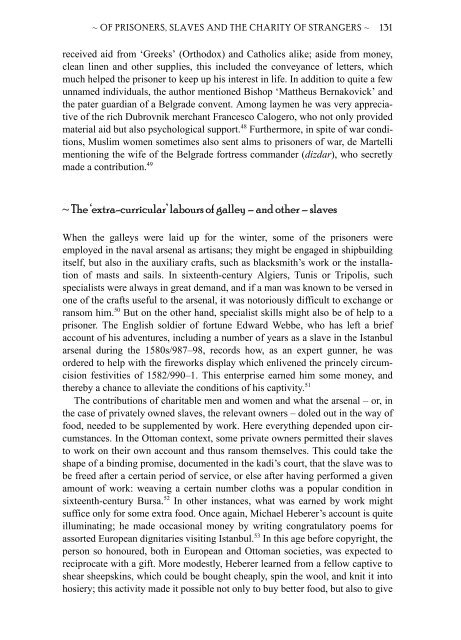The Ottoman Empire and the World Around It - Course Information
The Ottoman Empire and the World Around It - Course Information
The Ottoman Empire and the World Around It - Course Information
Create successful ePaper yourself
Turn your PDF publications into a flip-book with our unique Google optimized e-Paper software.
~ OF PRISONERS, SLAVES AND THE CHARITY OF STRANGERS ~ 131<br />
received aid from ‘Greeks’ (Orthodox) <strong>and</strong> Catholics alike; aside from money,<br />
clean linen <strong>and</strong> o<strong>the</strong>r supplies, this included <strong>the</strong> conveyance of letters, which<br />
much helped <strong>the</strong> prisoner to keep up his interest in life. In addition to quite a few<br />
unnamed individuals, <strong>the</strong> author mentioned Bishop ‘Mat<strong>the</strong>us Bernakovick’ <strong>and</strong><br />
<strong>the</strong> pater guardian of a Belgrade convent. Among laymen he was very appreciative<br />
of <strong>the</strong> rich Dubrovnik merchant Francesco Calogero, who not only provided<br />
material aid but also psychological support. 48 Fur<strong>the</strong>rmore, in spite of war conditions,<br />
Muslim women sometimes also sent alms to prisoners of war, de Martelli<br />
mentioning <strong>the</strong> wife of <strong>the</strong> Belgrade fortress comm<strong>and</strong>er (dizdar), who secretly<br />
made a contribution. 49<br />
~ <strong>The</strong> ‘extra-curricular’ labours of galley – <strong>and</strong> o<strong>the</strong>r – slaves<br />
When <strong>the</strong> galleys were laid up for <strong>the</strong> winter, some of <strong>the</strong> prisoners were<br />
employed in <strong>the</strong> naval arsenal as artisans; <strong>the</strong>y might be engaged in shipbuilding<br />
itself, but also in <strong>the</strong> auxiliary crafts, such as blacksmith’s work or <strong>the</strong> installation<br />
of masts <strong>and</strong> sails. In sixteenth-century Algiers, Tunis or Tripolis, such<br />
specialists were always in great dem<strong>and</strong>, <strong>and</strong> if a man was known to be versed in<br />
one of <strong>the</strong> crafts useful to <strong>the</strong> arsenal, it was notoriously difficult to exchange or<br />
ransom him. 50 But on <strong>the</strong> o<strong>the</strong>r h<strong>and</strong>, specialist skills might also be of help to a<br />
prisoner. <strong>The</strong> English soldier of fortune Edward Webbe, who has left a brief<br />
account of his adventures, including a number of years as a slave in <strong>the</strong> Istanbul<br />
arsenal during <strong>the</strong> 1580s/987–98, records how, as an expert gunner, he was<br />
ordered to help with <strong>the</strong> fireworks display which enlivened <strong>the</strong> princely circumcision<br />
festivities of 1582/990–1. This enterprise earned him some money, <strong>and</strong><br />
<strong>the</strong>reby a chance to alleviate <strong>the</strong> conditions of his captivity. 51<br />
<strong>The</strong> contributions of charitable men <strong>and</strong> women <strong>and</strong> what <strong>the</strong> arsenal – or, in<br />
<strong>the</strong> case of privately owned slaves, <strong>the</strong> relevant owners – doled out in <strong>the</strong> way of<br />
food, needed to be supplemented by work. Here everything depended upon circumstances.<br />
In <strong>the</strong> <strong>Ottoman</strong> context, some private owners permitted <strong>the</strong>ir slaves<br />
to work on <strong>the</strong>ir own account <strong>and</strong> thus ransom <strong>the</strong>mselves. This could take <strong>the</strong><br />
shape of a binding promise, documented in <strong>the</strong> kadi’s court, that <strong>the</strong> slave was to<br />
be freed after a certain period of service, or else after having performed a given<br />
amount of work: weaving a certain number cloths was a popular condition in<br />
sixteenth-century Bursa. 52 In o<strong>the</strong>r instances, what was earned by work might<br />
suffice only for some extra food. Once again, Michael Heberer’s account is quite<br />
illuminating; he made occasional money by writing congratulatory poems for<br />
assorted European dignitaries visiting Istanbul. 53 In this age before copyright, <strong>the</strong><br />
person so honoured, both in European <strong>and</strong> <strong>Ottoman</strong> societies, was expected to<br />
reciprocate with a gift. More modestly, Heberer learned from a fellow captive to<br />
shear sheepskins, which could be bought cheaply, spin <strong>the</strong> wool, <strong>and</strong> knit it into<br />
hosiery; this activity made it possible not only to buy better food, but also to give


